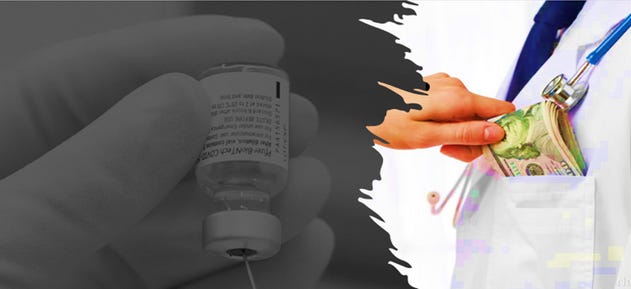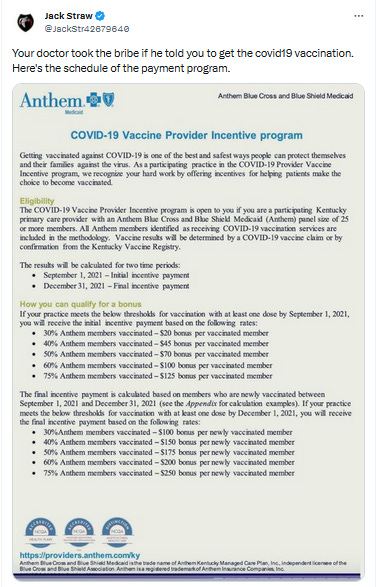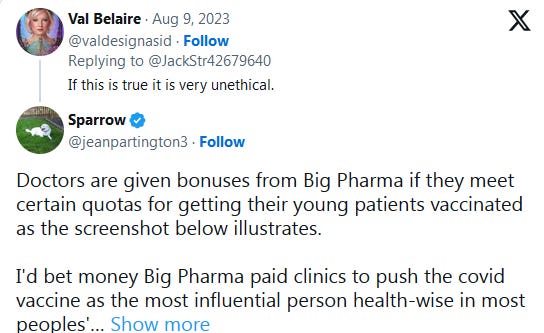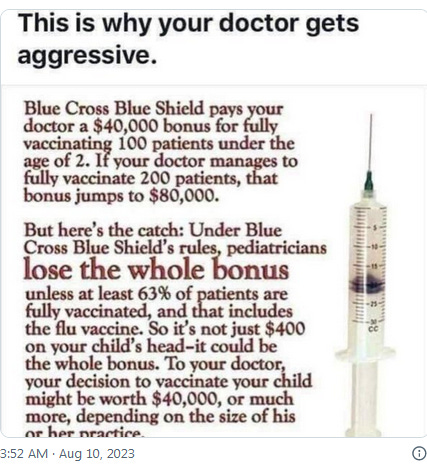Leaked Documents Show American Doctors Were Financially Rewarded For Pushing The Covid Jab
Disclaimer: Not all Doctors are in the profession for the paycheck and many are a Godsend and treat their role as their vocation
August 21, 2023
Millions of Americans were advised by their doctors to get “vaccinated” for the Wuhan coronavirus (COVID-19) – not because they actually care about their patients, mind you, but because they were bribed by health insurance companies to peddle as many jabs as possible in exchange for cash.
A leaked document from Anthem Blue Cross and Blue Shield (BCBS) Medicaid shows how the health provider created a “COVID-19 Vaccine Provider Incentive program” to reward doctors for pushing covid jabs on their patients (source). Does this against their Hippocratic Oath?
“Getting vaccinated against COVID-19 is one of the best and safest ways people can protect themselves and their families against the virus,” Anthem Medicaid claims in the document’s opener.
“As a participating practice in the COVID-19 Provider Vaccine Incentive program, we recognize your hard work by offering incentives for helping patients make the choice to become vaccinated.”
Bad things happen when dispensing experimental drugs is incentivized.
In order to qualify for cash bribes from Anthem Medicaid, a physician must, in this particular case, be part of a participating Kentucky primary care provider that is allied with Anthem BCBS Medicaid and have a panel size of 25 or more members.
“All Anthem members identified as receiving COVID-19 vaccination services are included in the methodology,” the document states. “Vaccine results will be determined by a COVID-19 vaccine claim or by confirmation from the Kentucky Vaccine Registry.”
Anthem calculated the payments to be disbursed in two separate time periods: the first one on Sept. 1, 2021, and the second on Dec. 31, 2021. The greater the percentage of Anthem members vaccinated for covid, the higher the payments, according to the plan.
For each Anthem member vaccinated up to 30 percent of the member pool, a physician qualified to receive a $20 “bonus” payment. If a doctor can get more than 30 percent of Anthem members jabbed, he or she received $45 for each up to 40 percent; $70 for each up to 50 percent; $100 for each up to 60 percent; and $125 for each at 75 percent and beyond.
The structure for the second and final bribe payment was similar except the payment tiers are much higher. If 30 percent of Anthem members got jabbed, a qualifying doctor received $100 per newly jabbed member. The rest is as follows:
40 percent of Anthem members vaccinated equals $150 bonus per newly jabbed member
50 percent of Anthem members vaccinated equals $175 bonus per newly jabbed member
60 percent of Anthem members vaccinated equals $200 bonus per newly jabbed member
75 percent of Anthem members vaccinated equals $250 bonus per newly jabbed member
Depending on the size of the practice and how many qualifying patients got jabbed, this equates to a lot of money for the best convincers. And with money constantly being dangled on a stick as an incentive, it is unlikely that qualifying doctors ever bothered to warn their patients of the risks involved – because to do so might have deterred them from getting jabbed, resulting in less bribe money.
“My child’s pediatrician made over $750,000 from Pfizer during covid,” one commenter claimed about a similar bribery program at another healthcare provider. “It’s documented in the national open-source public website.”
The Hippocratic Oath
The Hippocratic Oath (Ορκος) is perhaps the most widely known of Greek medical texts. It requires a new physician to swear upon a number of healing gods that he will uphold a number of professional ethical standards. According to the American government’s National Library of Medicine – National Institutes of Health (NLM-NIH).
However, the NLM NIH state that the Hippocratic Oath has been rewritten over the centuries, “often in order to suit the values of different cultures influenced by Greek medicine.” and “contrary to popular belief, the Hippocratic Oath is not required by most modern medical schools, although some have adopted modern versions that suit many in the profession in the 21st century.” It also does not explicitly contain the phrase, “First, do no harm,” which is commonly attributed to it, but surely we should expect that this is an absolute given in medicine and “First do no harm” must be a fundamental principle of medical ethics.
Purely for the Paycheck?
However, I found an old article dated 2015 from a doctor online Kevin MD, who explains that there are people who set out on a health care career purely for the paycheck from the very beginning and “never had any delusions about helping people and they never will.” These doctors are few and far between, and almost nobody starts out that way, but some end up that way he says, this is due to various reasons, below are the doctors observations that you may find interesting:
“Pure greed. Let’s get this one out of the way first. There are people who set out on a healthcare career purely for the paycheck from the very beginning. They never had any delusions about helping people and they never will. These people are rare and difficult to identify as they do not wear their greed as a badge of honor, but they do exist.”
“Medical-legal pressure. Every bad outcome that led to a lawsuit changes us, he says, “And we slowly develop a rigid business relationship with patients based solely on risks and benefits rather than the compassion we once felt.”
“Commercial pressure. No matter what your work setting, there will always be pressure to produce financially, especially in the environment of seemingly constantly declining reimbursements. At a minimum, you are going to be expected to generate enough revenue to cover your own salary and benefits.”
“Lack of job satisfaction. When we started as bright-eyed medical students, we all imagined a version of medicine that is much rosier than its actual practice. That optimism gets slowly beaten out of us by every drug seeker and every patient with a factitious disorder. When you start to doubt whether you are helping the sick and needy, then it becomes easy to view medicine as “just another job.”
“Medical-legal pressure. Every bad outcome that led to a lawsuit changes us. And we slowly develop a rigid business relationship with patients based solely on risks and benefits rather than the compassion we once felt. To give you an example, when I was asked by a patient whether she can get a copy of her arthrogram report, I asked her to contact the medical records department in the afternoon. Only later did I realize I could have just gotten her phone number and called her myself after reading out the arthrogram! Now I had no fear of being sued whatsoever, but the system was set up in a way that I did not even think of such a simple solution.”
“Templates. Electronic medical records (EMR) has done a lot of good for medicine. Increased efficiency, sharing, data aggregation and analysis. But EMR also brought templates, and templates make it easy to not care. Don’t get me wrong – I love templates and use them every day. But think of how many perfect H&Ps came from the orthopedist who you know for a fact doesn’t carry a stethoscope. Templates alone don’t make you not care, but they sure make it easy.”
“Lack of meaningful wealth or knowledge to attain it. This is the most important factor, and unfortunately is one that many physicians lack. Let’s face it, money is a necessity in modern life. You need it for food, shelter, education, transportation, pretty much everything. Some call it “financial independence,” but when you have meaningful wealth, you lessen the financial imperative to practice medicine and give yourself the freedom to focus on the things that drove you to become a healer in the first place. Those physicians who are focused on the paycheck are often financially strapped despite their high incomes. Therefore, they fall prey to all of the other factors listed above and become trapped in the rat race like so many other non-physicians.”
The “Covid” Era
These observations were from a doctor before the “Covid” era. We can only imagine that during this period aspects of what may cause a doctor to be “purely for the paycheck” could have increased. For instance, there would have been more “templates” allowing an “increased efficiency” through a pre-planned script from the orchestrators of the plandemic.
This would have potentially taken away the need to independently assess the situation, or even question the pharmaceutical industry’s judgement that they have been so used to having complete faith in. “The system was set up in a way” that a doctor did not need to think of such a simple solution.” that had been done for them,
The job certainly seemed to us to “develop a rigid business relationship […] rather than “compassion.” Slowly but surely, the business relationship governed by big pharma, has taken the “care” out of many a healthcare practice and made it purely about big business. If anything needs to have a “great reset” it would be this and enable doctors to practice medicine by for the patients without the need for bribery from the pharmaceutical companies.
Modern Hippocratic Oath.
Included in a modern Hippocratic Oath written by Louis Lasagna in 1964 include the lines:
“I will remember that there is art to medicine as well as science, and that warmth, sympathy, and understanding may outweigh the surgeon’s knife or the chemist’s drug.“
“I will remember that I remain a member of society, with special obligations to all my fellow human beings, those sound of mind and body as well as the infirm.”
“I will apply, for the benefit of the sick, all measures [that] are required, avoiding those twin traps of overtreatment and therapeutic nihilism.”







